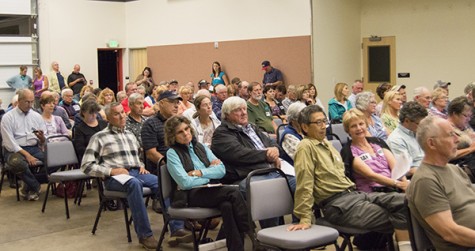I-502 farmers fight to grow
October 9, 2014
The Kittitas County Planning Commission heard an earful from concerned Kittitas County citizens Tuesday night as the hearing approached its final and most controversial topic, marijuana production and processing.
Scattered amongst a crowd of about 100 people were a number of I-502 supporters, and an overwhelming amount of people against marijuana cultivation.

FULL HOUSE – Opponents and supporters of marijuana met Thursday
A group of people, called Save Our Agricultural and Rural Space (SOARS), were handing out generic bold stickers reading ‘NOT AG’ and ‘BAN’ outside of the armory. SOARS has been to many public meetings to protest marijuana in the past.
County hearings are supposed to be professional with a strict structure. Tuesday night at the armory was anything but formal. Anti-marijuana advocates had to be stifled several times by planning officials.
Many citizens in the Badger Pocket area are angered by plans of a state-of-the art marijuana facility being built in ‘their backyard.’
John H. F. Ufkes, attorney at law, was one of the first anti-marijuana proponents to speak at the hearing.
“I don’t believe that marijuana production and processing should be allowed anywhere but in the industrial zone,” Ufkes said, referring to areas closer to Ellensburg where many large hay processing facilities are located.

The Kittitas County Planning Commission
TJ McDonald, I-502 applicant and CWU graduate, spoke on behalf of marijuana farmers.
Safety concerns for citizens living near the facilities and crop contamination issues for hay farmers are other matters that concern the anti-marijuana crowd.
Kittitas County has continued to propose changes on zoning marijuana companies and the rules and regulations these producers and processors have to follow, despite already having licensed and zoned marijuana farms. One of these licensed operating producers is Mike Graham of Natural Mystic Farms.
“Some of the misconceptions that marijuana can cross pollinate hay, it is not consistent with the county’s noxious weed board,” Graham said. “Stop the rumor mongering.”
Changes to greenhouse regulations, bans on outdoor growing, conditional use permits and changes to water rules are other topics of concern for pro I-502 folks.
“I don’t understand some of these comments that the farming I do isn’t agricultural,” Graham said. “All the practices I take are identical to a farmer who would raise tomatoes or other vegetables.”
Heather Hjorth, of the Kittitas County Cannabis Alliance, also addressed the county officials.
“Changing the rules at this point in the game is simply unfair,” Hjorth said. Snickering from the crowd commenced, followed by county officials asking for silence from the audience.
In regard to banning outdoor grow operations and greenhouse regulations being changed, the planning commission has written this in their proposed changes:
“All marijuana production shall take place inside of a rigid frame, fully enclosed, green house or indoor grow facility. Temporary growing structures as described in previous code shall NOT be permitted for marijuana production.”
Cyrena Stefano, a licensed marijuana producer in Kittitas County, said that with the changes the officials are proposing, “It would really push toward the indoor factory farm that we know many people are concerned with.”
Many I-502 farmers would prefer to take the less expensive route compared to building a state-of-the-art industrial facility on industrial plots of land, while keeping rural characteristics on rural agricultural plots of land.

